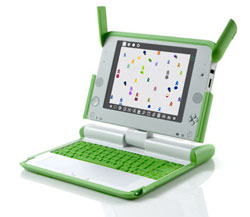What started innocently as flame bait on thepete.com managed to turn into a full-length tirade, in which I reply to my friend the eponymous Pete, about how the $400 OLPC laptop is just about the most extravagant, useless toy self-satisfied geeks have bestowed upon the third world. The idea behind the laptop is that it is a tool to better educate the children of developing nations so they can become better farmers, diplomats, 419 scammers, and camwhores, but it doesn’t live up to the hype.
And I hope they don’t mean for the laptop to be a literal tool for farming, because things like shovels, seed, and a plough will do a lot more to actually feed a family than a link to subsistence farming on WikiHow.
 This laptop is a luxury item, and to developing nations, it’s a bowling ball present. When the people buying them are singing its praises about how one can chat, surf the web and blog with it, I’m not convinced of the laptop’s efficacy as an educational tool. The thing’s got a D-pad and buttons. This isn’t an educational tool, it’s a Nintendo DS! A school I would believe.
This laptop is a luxury item, and to developing nations, it’s a bowling ball present. When the people buying them are singing its praises about how one can chat, surf the web and blog with it, I’m not convinced of the laptop’s efficacy as an educational tool. The thing’s got a D-pad and buttons. This isn’t an educational tool, it’s a Nintendo DS! A school I would believe.
Nevermind that the laptop also needs an internet connection to actually find any of this essential information online, and trained people to maintain that network infrastructure. I don’t know if countries that lost a third of their population to civil war will find the time to spec out an IT department.
But most of all, this sounds like the 21st century equivalent of the wide-eyed optimism of the 1950s that the television would become some sort of learning box panacea. And we all know how that turned out (Baby Einstein, anyone?).
I think the OLPC is a neat little laptop, if a little underpowered and with a smaller HD than my phone, and owning one might be fun. But the idea that this is what the 3rd world really needs, over things like food, medicine, sustainable farming methods and free public education? Give me a break. This is an over-extravagant way of educating one child. A school would be better, and is less likely to get stolen or sold for something useful.
Oh, and we don’t have one laptop per child in America… and we’re expecting this to catch on in Somalia?
4 replies on “The Hundred Dollar Laptop, yours for $400”
Hey, check it out. I disagree with you but rather than troll your post, I’ll just leave you to your opinion. Awfully nice of me, huh?
But I wanted to hear what you have to say, though I may disagree with it. 🙁
Hi! I actually write for wikiHow and have done some work to help select articles for OLPC.
I think part of the reason for OLPC is that people are already being donated farming equipment and livestock through organizations like Oxfam, the Heifer Project and Church World Service. While I don’t think charity should be ruled by trends, the fact is that microloan programs are very big right now. And personally, I’ve given to Heifer and Unicef, but I think people need access to ideas and a means of self-expression as well as access to stuff.
In terms of giving things to third world countries, the emphasis is mostly on giving people stuff, not information. In the US, there are libraries with expensive databases and journal subscriptions most people couldn’t afford otherwise. People in developing nations often don’t have access to information.
Yes, it sometimes irks me to see the OLPC laptop touted in the blogosphere as this cool geek toy instead of something designed to aid in education. I’ve seen the laptop in person and it is equipped with a word processor, a webcam and other tools to help young people express themselves — tools they wouldn’t have otherwise. But I agree that the success of OLPC up to date has been as a good idea, a noble cause, and a design marvel you see displayed at MoMA and the San Francisco airport.
You have to remember though that the project is still pretty new and I think the goals are still a ways off — maybe even 20 years or so. I don’t think that means that the project should stop though, especially since in the developing world many kids don’t get past the fifth grade.
There’s no guarantee that this computer will make a difference in the lives of children in developing worlds, but there’s a decent possibility that it might. Experimenting with different ways to help the impoverished and undereducated is a good thing, don’t you think? I’m not saying you don’t have a point that there may be other, better things for people to do. I am saying it’s no skin off your nose.